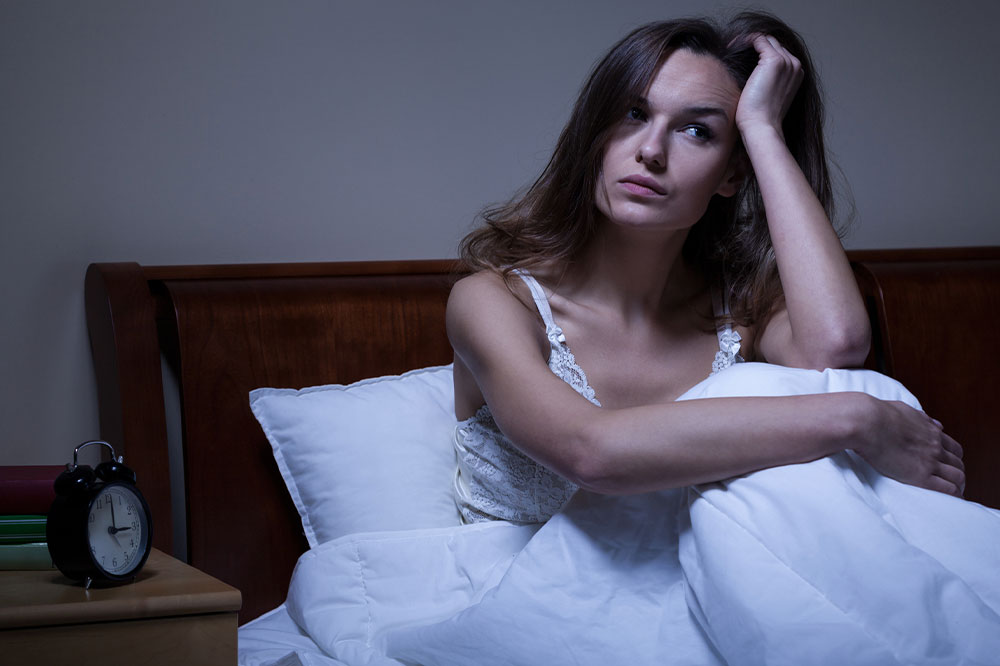Causes, Symptoms, and Management Options for Insomnia

Insomnia is a long-term condition wherein one has trouble falling asleep. However, not everyone who has sleeping problems has insomnia. It is also important to know that if one doesn’t get 8 hours of sleep daily, it need not be due to insomnia, there could be various other reasons. Insomnia can lead to other problems like fatigue, exhaustion, lack of productivity, absentmindedness, and concentration issues. Let us understand the causes, symptoms, and treatment options for insomnia.
What is insomnia
Most of us would have spent a few days of our life finding it difficult to sleep. If this happens rarely, it cannot be considered insomnia. Doctors say that one could have insomnia if one’s sleep quality is poor and one has the following problems for three nights a week for at least three months:
Lying awake in bed while tossing and turning for a long time before falling asleep
Staying awake most of the night
Wake up often and find it difficult to go back to sleep
Wake up too early in the morning
Types of insomnia
The following are the different types of insomnia:
Adjustment insomnia
It is adjustment insomnia if a person cannot fall asleep or stay asleep due to excitement or stress. It can happen before important life or social events. People with traveling jobs and work across multiple time zones are most likely to have adjustment insomnia. The symptoms of adjustment insomnia stop when the stressful event is over. Adjustment insomnia lasts less than three months, hence is also called short-term insomnia or acute insomnia.
Chronic insomnia
Chronic insomnia is considered chronic if one has problems sleeping or staying asleep for three nights per week for three or more months. They may have a long history of sleeping problems, resulting in inadequate sleep. The symptoms may continue permanently or, for some, repeat in episodes that last for months or weeks.
Both chronic and adjustment insomnia can happen to youngsters and adults, irrespective of age, but generally, women are at a higher risk for having insomnia.
Causes of insomnia
Insomnia can be caused by many biological, psychological, and social triggers, leading to a person getting inadequate sleep. A few of the common causes of insomnia are:
Poor sleeping habits
People who do not sleep at a specific time, get up at a set time in the morning, or have short naps anytime during the day may not get the right amount of sleep at night. People who use gadgets until they fall asleep, watch movies, and play games till late at night can also develop insomnia. People who sleep in an uncomfortable environment with poor bedding, lighting, or ventilation can also develop insomnia.
Persistent stress
When a person goes through financial troubles, personal issues, challenging situations at work, etc., or having anxiety issues can cause stress and lead to sleep problems.
Hectic work schedule
People who travel too much for work or those in touring jobs may develop insomnia as they sleep in new hotels or environments. Our body follows circadian rhythms, a 24-hour cycle that guides our mental and physical behavior. Frequent travel and change in sleeping patterns can disturb the circadian rhythm. People who work night shifts can also develop insomnia.
Poor eating habits
Eating right before dinner or having too many caffeinated beverages during the day can slow our metabolism. It can lead to heartburn, regurgitation, and bloating, preventing one from sleeping.
Treatment for insomnia
Doctors use a combination of pharmacological and non-pharmacological treatments to help patients with insomnia. The typical treatment for insomnia includes:
Pharmacological methods :
There are many prescription treatments available that have to be taken only under the supervision of a physician and ideally used for a short-term. Some herbal supplements and over-the-counter products may contain an antihistamine to help a person sleep better. Consuming products that promise to help sleep better is not advisable as they could cause serious side effects and complications to a person’s health.
Non-pharmacological methods
Cognitive behavioral therapy
Psychiatrists use cognitive behavioral therapy and talk to a person about how thoughts and emotions affect one’s behavior. They find the root cause of one’s sleeping disorder and work out a solution to control their thoughts and reduce stress, leading to better sleep quality.
Relaxation training
These are a group of techniques like mindfulness, meditation, and visualization that help one relax. Practicing these techniques regularly can help a person develop healthy sleeping routines.
Sleep hygiene training
The training may last about a month, during which one will be taught to develop good habits like sleeping and waking up at a specific time, switching off gadgets before sleeping, or identifying the right mattress to help one sleep well. One will be trained to practice a hobby before sleeping or having a warm shower. One can follow this permanently to relieve insomnia.
Sleep restriction
Sleep restriction is one of the most successful treatment methods where doctors restrict sleep time to help one develop good sleeping habits and gradually increase the timing. One must maintain a sleep diary or a sleep-tracking app to track the number of hours one sleeps.
Side effects of pharmacology treatment
Lack of sleep is a common side effect of antidepressants and other pharmacological treatments prescribed for asthma, blood pressure, or allergies.
Sleeping disorders
Those diagnosed with sleeping disorders like sleep apnea or those with involuntary limb movements like restless leg syndrome are more likely to develop insomnia.
Existing health conditions
People diagnosed with chronic diseases like diabetes, blood pressure, heart disease, GERD, overactive thyroid, bladder or prostate issues, parkinson’s, or alzheimer’s may see disruption in their sleeping patterns, eventually leading to insomnia.
Psychiatric problems
People suffering from anxiety, depression, or post-traumatic stress disorder may wake up early and be unable to go back to sleep.
Age
Sleep quality is likely to reduce as one age, and it is pretty normal for people above 60 to sleep less than they are used to. They may wake up more than once at night and find it difficult to sleep. The pattern may eventually lead to insomnia.






